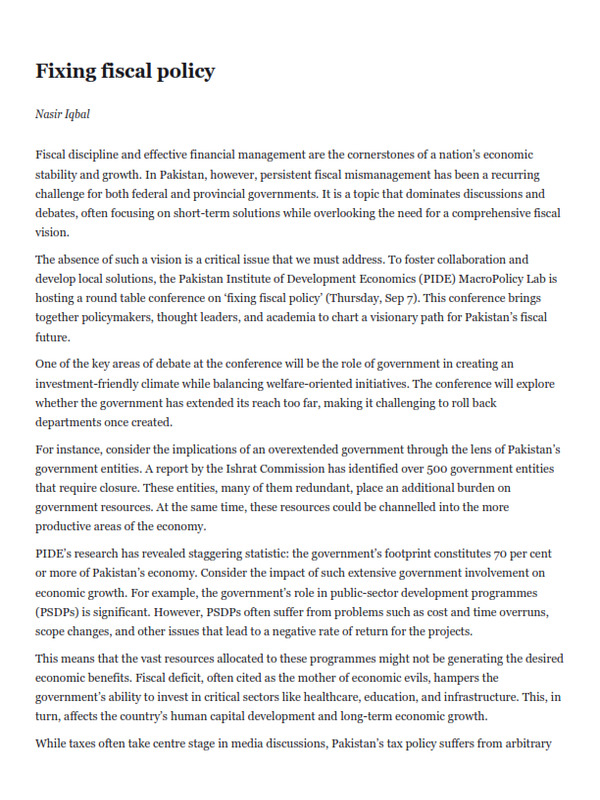Fixing fiscal policy
Fiscal discipline and effective financial management are the cornerstones of a nation’s economic stability and growth. In Pakistan, however, persistent fiscal mismanagement has been a recurring challenge for both federal and provincial governments. It is a topic that dominates discussions and debates, often focusing on short-term solutions while overlooking the need for a comprehensive fiscal vision.
The absence of such a vision is a critical issue that we must address. To foster collaboration and develop local solutions, the Pakistan Institute of Development Economics (PIDE) MacroPolicy Lab is hosting a round table conference on ‘fixing fiscal policy’ (Thursday, Sep 7). This conference brings together policymakers, thought leaders, and academia to chart a visionary path for Pakistan’s fiscal future.
One of the key areas of debate at the conference will be the role of government in creating an investment-friendly climate while balancing welfare-oriented initiatives. The conference will explore whether the government has extended its reach too far, making it challenging to roll back departments once created.
For instance, consider the implications of an overextended government through the lens of Pakistan’s government entities. A report by the Ishrat Commission has identified over 500 government entities that require closure. These entities, many of them redundant, place an additional burden on government resources. At the same time, these resources could be channelled into the more productive areas of the economy.
PIDE’s research has revealed staggering statistic: the government’s footprint constitutes 70 per cent or more of Pakistan’s economy. Consider the impact of such extensive government involvement on economic growth. For example, the government’s role in public-sector development programmes (PSDPs) is significant. However, PSDPs often suffer from problems such as cost and time overruns, scope changes, and other issues that lead to a negative rate of return for the projects.
This means that the vast resources allocated to these programmes might not be generating the desired economic benefits. Fiscal deficit, often cited as the mother of economic evils, hampers the government’s ability to invest in critical sectors like healthcare, education, and infrastructure. This, in turn, affects the country’s human capital development and long-term economic growth.
While taxes often take centre stage in media discussions, Pakistan’s tax policy suffers from arbitrary revisions, mini budgets, and IMF conditionalities. Inefficient tax administration compounds the challenges. Our conference aims to explore long-term reforms for a modern tax policy that minimizes distortion, maintains low tax rates, and encourages investment and enterprise growth. Additionally, we will discuss how a modernized tax administration, leveraging technology, can support this proposed policy.
Consider this: in a simplified tax system with lower rates, businesses are incentivized to invest and expand, leading to job creation and economic growth. Contrast this with a complex and distortionary tax system where businesses spend significant resources on compliance, reducing their capacity to invest in expansion. The tax revenue collected might be high in the short term, but the long-term economic growth potential remains stunted.
Pakistan’s debt management system is currently fragmented and lacks coherence. The conference will delve into the intricacies of debt management, best practices for public debt, the role of quasi-fiscal debt, treasury management, forecasting debt requirements, external debt issues, debt sustainability, and subnational debt markets. We will consider how to recognize the economic potential of foreign debt and streamline our debt management practices.
Consider the case of external debt. Properly managed, foreign debt can bring in crucial cash flows to fund development projects and stimulate economic growth. However, the lack of a clear strategy for foreign borrowing and utilization can lead to the accumulation of debt without reaping its full economic benefits. The conference will aim to shed light on how Pakistan can harness the economic potential of its debt and ensure responsible management.
Pakistan is also facing a critical dual challenge of rising inflation and unemployment. Escalating inflation rates are diminishing the purchasing power of households, predominantly affecting low and middle-income groups. Simultaneously, persistent unemployment and underemployment are leaving a significant portion of the workforce struggling to find meaningful employment opportunities.
The exponential increase in energy prices further exacerbates these issues, adding immense pressure on businesses and households. This predicament calls for innovative fiscal policies to be discussed at the conference which aims to address these complex challenges by seeking sustainable strategies to balance inflation control with job creation and economic revival.
This conference is part of PIDE’s broader series on 3R ‘rethink, reform, revive’. It aligns with our commitment to reimagining policies, reforming practices, and reviving economic prospects. By focusing on fiscal policy, we recognize that it is a linchpin that can either propel or hinder a nation’s economic progress. It is a topic that affects every Pakistani, from the government’s role in their daily lives to the taxes they pay and the services they receive.
The success of this conference will depend on robust discussions, thoughtful insights, and collaborative efforts. Together, we can lay the foundation for a stronger and more resilient economic future for Pakistan. Let’s come together to ‘fix fiscal policy’, not just for today but for the generations to come.
The writer is associate professor at the Pakistan Institute of Development Economics (PIDE). He can be reached at: [email protected]




